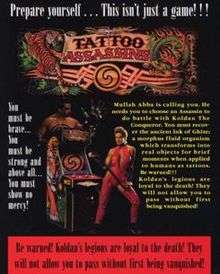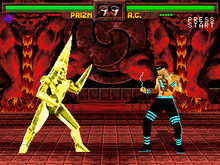Tattoo Assassins
| Tattoo Assassins | |
|---|---|
 Tattoo Assassins arcade flyer | |
| Developer(s) | Data East Pinball |
| Publisher(s) | Data East |
| Director(s) | Bob Gale |
| Producer(s) | Mike Marvin |
| Designer(s) |
Joe Kaminkow Eddi Wilde (stunt coordinator) John Carpenter (programmer) |
| Artist(s) |
Paul Faris Bob Short (make-up artist) |
| Writer(s) | Bob Gale |
| Composer(s) | Brian L. Schmidt |
| Platform(s) | Arcade |
| Release | 1994 (prototype) |
| Genre(s) | Fighting |
| Mode(s) | Up to 2 players simultaneously |
| Cabinet | Standard |
| Arcade system | Data East DECO32 |
| CPU | ARM (@ 7 MHz) |
| Sound |
Sound CPU: M6809 (@ 2 MHz) Sound chip: BSMT2000 (@ 24 MHz) |
| Display | Raster, 320 x 240 pixels (horizontal), 2048 colors |
Tattoo Assassins is a unreleased 1994 fighting game developed by the pinball division of Data East for release in arcades. A few prototypes were test-marketed, but the game was never officially released. Spearheaded by Bob Gale (screenwriter for Back to the Future) and Joe Kaminkow (leader of Data East Pinball, now known as Stern Pinball), Tattoo Assassins was designed to be Data East's answer to Mortal Kombat.
As the game was essentially completed before it was cancelled, the game is easily obtainable and playable sans some minor gameplay and sound glitches. Downloads and rare prototype test cabinets containing near-final versions of the game can be played. A limited number of prototype cabinets of the game were released to test markets in 1994.
Development

Tattoo Assassins was developed to compete with the popular Midway fighting game franchise Mortal Kombat. The project was spearheaded by Joe Kaminkow (leader of Data East Pinball, a subsidiary of Data East Japan) and Bob Gale (screenwriter for Back to the Future) and put into development at Data East Pinball for a planned arcade release. Using the same style of digitized graphics as Mortal Kombat, Tattoo Assassins featured real life actors fighting each other with violent moves and combos. Most notable is that the game featured 2196 finishing moves, including some nudity-based finishers (only a rumor in Mortal Kombat) and animal-based finishers (before they were featured in Mortal Kombat 3 as "Animalities"). Some included dropping a DeLorean car onto the opponent (a Back to the Future reference), turning the opponent into a hamburger (a reference to an earlier Data East game, BurgerTime), and massive diarrhea.
Each of the characters had magical tattoos, which came to life when they performed special attacks and finishing moves. Even though the game was never completely finished, EGM posted an in-depth article with moves and information about all of the characters.
Fighters
The following is a list of the fighters that appeared in this game:
- A.C. Current – A cyber mercenary who is wanted by his former employers after an industrial espionage double cross.
- Billy Two Moons – Stereotypical Native American character who is a fugitive from the U.S. government. He bears a resemblance to the character of Billy Jack. The Mortal Kombat 3 character Nightwolf also bears a resemblance, even lifting a few of Billy's moves for his own.
- Deke Kay – A fighting zombie who is one of the sub-bosses.
- Derek O'Toole – An Irish rock star who developed fighting skills after being falsely accused of terrorist activities.
- Hannah Hart – A stripper on a quest to avenge the death of her friend at the hands of a serial killer.
- Karla Keller – An ice skater who is a spoof of Nancy Kerrigan, from appearance to backstory.
- Koldan The Conqueror – A large man with a gloved hand with giant hypodermic needles in the fingers. The final boss of the game, he seeks to create an army of mutants and enslave the human race.
- Luke Cord – A former Navy SEAL wanted by the CIA for questioning after a military operation against the Soviet Union is compromised.
- Maya – An Amazon-like warrior woman who is battling land developers for control of her people's homeland.
- Prizm – Light-based crystal monster who is one of the sub-bosses.
- Rhina – A half-woman, half-rhino creature who is one of the sub-bosses.
- Takara "Tak" Hata – Former Yakuza assassin who is wanted by both the Yakuza and Japanese police after being framed for murder.
- Truck Davis – A biker who is the lone survivor after his gang is slaughtered. He seeks to avenge the death of his comrades.
Two other non-fighter characters that appear in the game's story are Mullah Abba, the spiritual leader of the Order of Colors who discovered the mysterious ink used by the fighters, and Lyla Blue, a mysterious woman who is used as a channel by Mullah Abba to allow the player to control one of the assassins in combat.
Cast
- Eddi Wilde – Billy Two Moons
- Kevin Knotts – Truck Davis / Koldan
- Charlie Rice – Luke Cord
- Melanie Baer – Maya
- Rick Mali – Takara Hata
- Gretchen Stockdale – Hannah Hart
- Maurice Travis – A.C. Current
- Cristine Dupree – Karla Keller
- Nicolas Andrews – Derek O'Toole
- Joanna Lee – Rhina
- William Zipp – Deke Kay / Prizm
- Mark Urgello – Mullah Abba
- Marushka Wilde – ??? (young girl, model for angel/devil finishing moves)
- Rene Hudson – Lyla Blu
Production and legacy
Internal development strife, management problems, deadline woes, and negative feedback from testers contributed to the game's troubled development and eventual downfall. With similar games like Killer Instinct and Primal Rage performing well, competing chances of Tattoo Assassins were slim and it was never put into production.
Even though the game was never released, several prototype models were produced for testing in arcades. Nearly two dozen machines were produced for the AMOA show in San Antonio in 1994, but most were later destroyed. Two machines reside at the PAPA headquarters, and a few others may exist in the wild.[1] Tattoo Assassins was also reviewed in Next Generation; the reviewer panned the game for poor synchronization between controls and characters, sometimes choppy animation, and most especially the game's "extraordinary lack of any real innovation."[2] In addition, the game's ROM has been dumped for use with the MAME arcade emulator and is available on the Internet.
After Data East filed for bankruptcy and became defunct in 2003, G-Mode bought the rights to Tattoo Assassins along with most of Data East's other titles.
References
- ↑ Classic Game Room - TATTOO ASSASSINS arcade game review Season 11 Ep. 191, October 04, 2012.
- ↑ "Tattoo Assassins". Next Generation. Imagine Media (4): 102. April 1995.